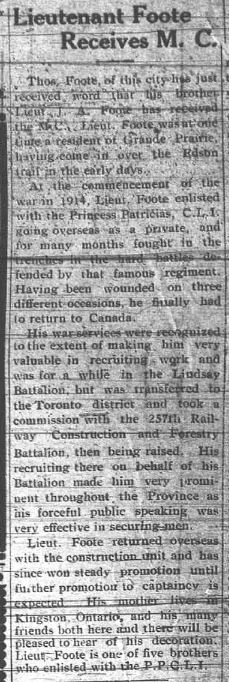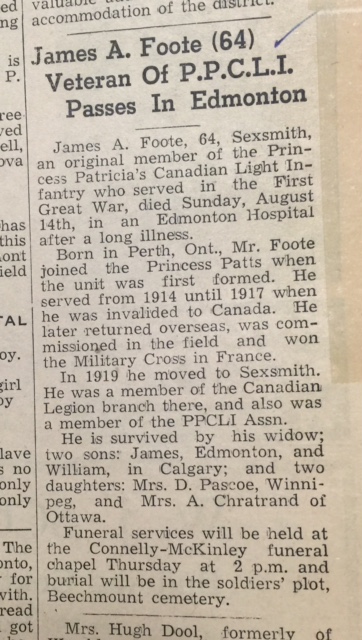James Archibald Foote was born in Perth, Ontario to David and Catherine Foote. His service files show some conflict regarding his date of birth, with his initial Attestation Paper stating July 23, 1880 and subsequent documents stating July 20, 1887. In August of 1914, at the onset of the First World War, James enlisted in the Princess Patricia’s Canadian Light Infantry and shipped overseas to serve on the Western Front.
The Princess Patricia’s fought at the Second Battle of Ypres, which lasted from April 22 until May 25, 1915. It was the first mass use of German poison gas, and also the battle during which Lt. John McCrae penned “In Flanders Fields.” In the days preceding the battle, James was digging communication trenches at Polygon Wood, near Ypres. On April 11, he “got a rifle bullet through left thigh, about 8 inches above the knee.” He spent eleven weeks in hospitals in France and England, but the wound had been a severe one and after leaving the hospital James still walked with a limp and experienced pain in his leg. He was discharged from the army and returned to Canada in January of 1916.
But James by no means left army life behind him. He was influential in recruiting for the 257th Railway Construction & Forestry Battalion; his forceful public speaking skills made him successful at securing men. On January 1, 1917 he reenlisted in the 256th Railway Construction Battalion. This time he left behind a wife; on March 22, 1917, four days before his departure, James married Nellie Alice Mason in Toronto.
James was a dedicated and courageous officer. On August 16, 1918, he was awarded the Military Cross “For conspicuous gallantry and devotion to duty while engaged in the maintenance of light railways. The area where he was working was subjected to intense shell fire, and the line was broken in six places. He repeatedly reorganised his working parties, who had suffered casualties, and by his example and encouragement kept his men at work under most difficult conditions. By his efforts the line was kept open, and the supply of ammunition was ensured.”
When he returned from overseas in 1919, James and Nellie moved to Sexsmith. James passed away in Edmonton on August 14, 1949 and was buried in the Soldiers’ Plot at Beechmount Cemetery.
Sources:
Service file at Library & Archives Canada
“The storied Princess Patricias regiment born during deadly conflict”


